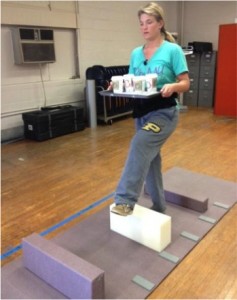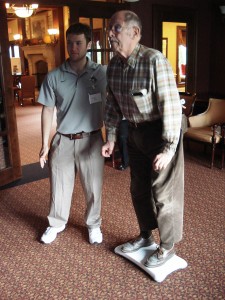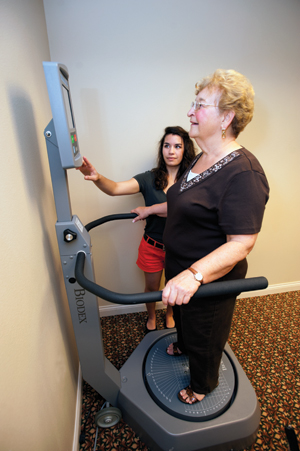 The goal of these studies are to examine how effective a variety of training paradigms are for improving balance and walking in older adults with and without Parkinson disease. Common daily tasks (like walking and talking) are typically multi-task in nature and more complex than they appear. Recent evidence suggests that falls occur most often during these common daily activities. Despite this, the efficacy of most balance training studies have been established using standardized balance scales or single measures rather than complex tasks which mimic those performed in daily life. To foster independence and quality of life, it is critical to establish the effectiveness of training paradigms for improving activities that are commonly encountered in everyday life.
The goal of these studies are to examine how effective a variety of training paradigms are for improving balance and walking in older adults with and without Parkinson disease. Common daily tasks (like walking and talking) are typically multi-task in nature and more complex than they appear. Recent evidence suggests that falls occur most often during these common daily activities. Despite this, the efficacy of most balance training studies have been established using standardized balance scales or single measures rather than complex tasks which mimic those performed in daily life. To foster independence and quality of life, it is critical to establish the effectiveness of training paradigms for improving activities that are commonly encountered in everyday life.
The knowledge gained from these studies will assist in the identification and development of effective training paradigms and the development of home training programs.
 Participants in these studies are asked to attend pre- and post-training sessions in the laboratory. Additionally, they are seen for training sessions, usually three times per week, for 8 to 12 weeks. We are enrolling both typically aging adults without Parkinson disease and adults with Parkinson disease. Participants enrolled in the studies cannot engage in balance training, physical therapy, or speech therapy while participating in the study. If you are interested in being involved in our studies, please contact us through the contact tab. Participants must live within 30-60 minutes from West Lafayette, Indiana.
Participants in these studies are asked to attend pre- and post-training sessions in the laboratory. Additionally, they are seen for training sessions, usually three times per week, for 8 to 12 weeks. We are enrolling both typically aging adults without Parkinson disease and adults with Parkinson disease. Participants enrolled in the studies cannot engage in balance training, physical therapy, or speech therapy while participating in the study. If you are interested in being involved in our studies, please contact us through the contact tab. Participants must live within 30-60 minutes from West Lafayette, Indiana.
 Collaborators:
Collaborators:
Peter Altenburger
Bruce Craig
Jeffrey Haddad
Meghan McDonough
Shirley Rietdyk
S. Elizabeth Zauber
Funding Provided by:
Microsoft Research
Indiana Clinical Translational Sciences Institute
